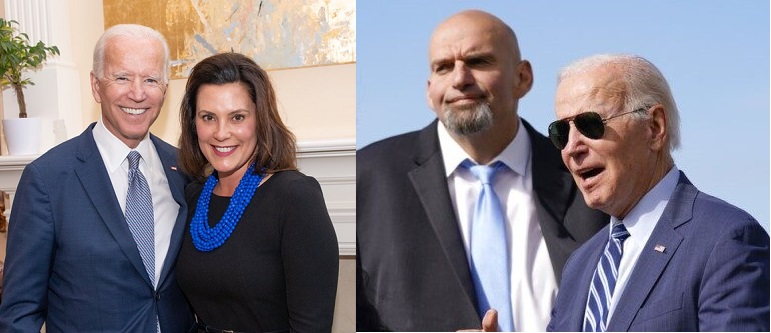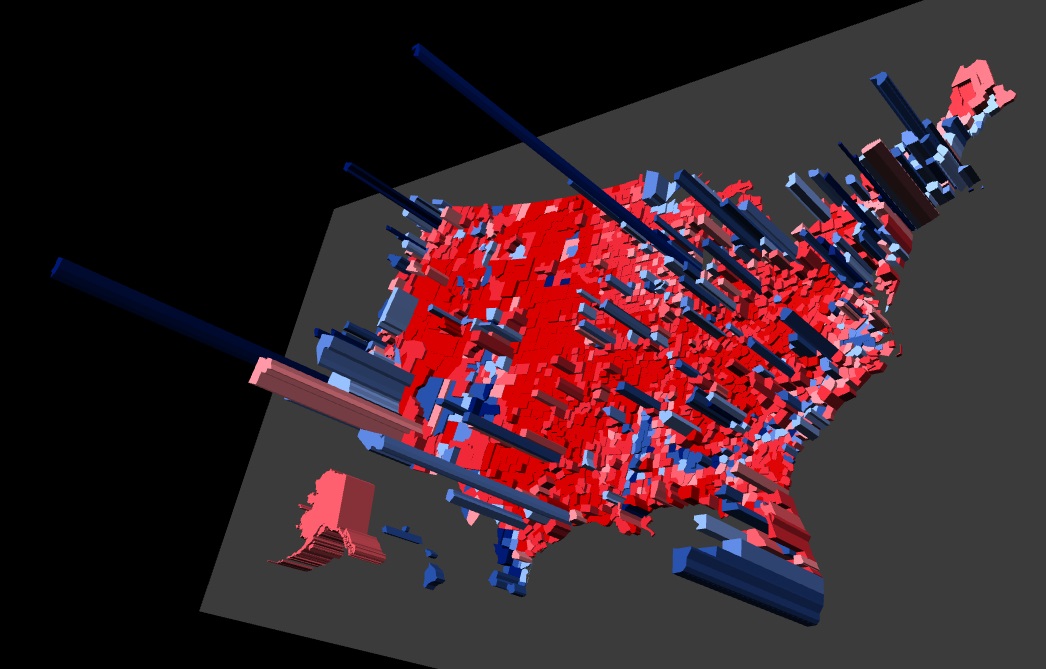You are using an out of date browser. It may not display this or other websites correctly.
You should upgrade or use an alternative browser.
You should upgrade or use an alternative browser.
Post ALL voter fraud shenanigans in this thread
- Thread starter SheriffJoe
- Start date
LolYep. 65%-70. MAGA "common sense" RED!
Mail in ballots + the machines = MEGA FRAUD!
View attachment 50290
MAGA vs MEGA FRAUD!
All dayYep. 65%-70% MAGA "common sense" RED!
Mail in ballots + the machines = MEGA FRAUD!
Trump won even in so-called "blue/purple" states..
View attachment 50290
MAGA vs MEGA FRAUD!
Free and free elections is the only issue that matters going forward.
In the meantime, enjoy SKYROCKETING EVERYTHING PRICES with a diesel shortage just days away.
They were trying to hold the economy together with spit and duct tape in order to avoid a bloodbath. Now that the midterms are over, they won't care. And the corrupt Uniparty won't save you - they only care about themselves!
Everything is about to go to shit, like you've never seen!

In the meantime, enjoy SKYROCKETING EVERYTHING PRICES with a diesel shortage just days away.
They were trying to hold the economy together with spit and duct tape in order to avoid a bloodbath. Now that the midterms are over, they won't care. And the corrupt Uniparty won't save you - they only care about themselves!
Everything is about to go to shit, like you've never seen!

Just wait when we find out that Trump actually won in 2020 and the republicans control all 3 branches.
it’s all in the playbook
just got the telegram message 12 minutes ago got off the presses.
And those who pay for premium subscription account received this message 17 minutes ago.
it’s coming
it’s all in the playbook
just got the telegram message 12 minutes ago got off the presses.
And those who pay for premium subscription account received this message 17 minutes ago.
it’s coming
Big Picture, 2022 Midterm Elections Highlight the Distinct Difference Between Ballots and Votes
November 9, 2022 | Sundance | 511 Comments
As the political discussion centers on the 2022 wins and losses from the midterm election, one thing that stands out in similarity to the 2020 general election is the difference between ballots and votes. It appears in some states this is the ‘new normal.’
Where votes were the focus, the Biden administration suffered losses. Where ballots were the focus, the Biden administration won.

Perhaps the two states most reflective of ‘ballots’ being more important than ‘votes’ are Michigan and Pennsylvania. Despite negative polling and public opinion toward two specific candidates in those states, Michigan Governor Gretchen Whitmer and Pennsylvania Senate candidate John Fetterman achieved victories.
Whitmer and Fetterman were not campaigning for votes, that is old school. Instead, the machinery behind both candidates focused on the modern path. The Democrat machines in both states focused on ballot collection and ignored the irrelevant votes as cast.
Since the advent of ballot centric focus through mail-in and collection drop-off processes, votes have become increasingly less valuable amid the organizers who wish to control election outcomes. As a direct and specific result, ballot collection has become the key to Democrat party success.
The effort to attain votes for candidates is less important than the strategy of collecting ballots.
It should be emphasized; these are two distinctly different election systems.
The system of ballot distribution and collection is far more susceptible to control than the traditional system of votes cast at precincts.
A vote cannot be cast by a person who is no longer alive, or no longer lives in the area. However, a ballot can be sent, completed and returned regardless of the status of the initially attributed and/or registered individual.
While ballots and votes originate in two totally different processes, the end result of both “ballots” and “votes,” weighing on the presented election outcome, is identical.
While initially the ballot form of election control was tested in Deep Blue states, through the process of mail-in returns under the guise and justification of “expanding democracy,” a useful tool for those who are vested in the distinction, I think we are now starting to see what happens on a national level when the process is expanded.
The controversial 2020 election showed the result of making ‘ballots’ the strategy for electoral success. Under the justification of COVID-19 mitigation, mail-in ballots took center stage. Ballot harvesting by Democrat operations was one term for the outcome.
Democrat party officials and political activist groups knew how to exploit the opportunities within the new system of ballot distribution and collection, and when you combine that with a massive legal pressure campaign to accept any and all forms of ballots, well, you can see how they are dependent.
Now that ballot collection has been shown to be a much more effective way to maintain political power, Democrats in a general sense are less focused on winning votes and more focused on gathering ballots.
When ‘ballot organization’ becomes more important than ‘vote winning,’ you modify your electoral campaign approaches accordingly. It might sound simplistic, but inside the distinct difference between ballots and votes you will find why refusing debates is a successful strategy.
If you are trying to win votes you could never fathom campaign success by refusing to debate an opponent. However, if your focus is centered around ballot collection, the debate is essentially irrelevant.
It’s time for voters to start seeing the difference between elections decided by ballots and elections decided by votes. Perhaps the 2022 midterm election will awaken people to the two completely different election systems.
You can vote at any scale you want, but when ballots are more important than votes – the election will always favor the former.
Michigan and Pennsylvania voters are likely very unhappy today, while Michigan and Pennsylvania ballot providers are smiling.
If Democrats had to win individual ‘votes’ to gain election success, they would be at a disadvantage. As long as Democrats only need to gather ‘ballots’, they have a path to winning elections. The processes of electioneering are all modified accordingly.
Campaigning, advertising, promoting, debating, hand-shaking, crowd attendance and venues for rallies, along with physically meeting people and convincing them of your worth, are only important if you are trying to win votes.
Fortunately for Democrats, modern electioneering does not require these arcane efforts. So, in the larger picture of what you see in elections, they have stopped wasting time and doing them. Haven’t you noticed? It really is that simple.

I love this "only DeSantis can save us now" narrative...any Fake News media bullshit to distract people from the truth - Dems STOLE another election.
As if DeSantis will be able to overcome the fraud machine...NOT!
Look at Ohio which LIT UP RED:
US Senator - R
US House - R (6 of 8)
Gov - R
Treasurer - R
AG - R
SOS - R
Auditor - R
State Senate - R (3 of 5)
State House - R (14 of 22)
State Supreme Court - R (3 of 3)
DeSantis? NO!
Rs had such amazing candidates, head and shoulders over Dems? No!
It WAS a RED WAVE, and free and fair election states reflected it.
It's the fraud, stupid!
As if DeSantis will be able to overcome the fraud machine...NOT!
Look at Ohio which LIT UP RED:
US Senator - R
US House - R (6 of 8)
Gov - R
Treasurer - R
AG - R
SOS - R
Auditor - R
State Senate - R (3 of 5)
State House - R (14 of 22)
State Supreme Court - R (3 of 3)
DeSantis? NO!
Rs had such amazing candidates, head and shoulders over Dems? No!
It WAS a RED WAVE, and free and fair election states reflected it.
It's the fraud, stupid!
Satire, right?
Nope, this is real:

 www.washingtonexaminer.com
www.washingtonexaminer.com
LMAO at all the Mockingbird Media narratives!
It's the fraud, stupid!
Nope, this is real:

Dead man reelected in Pennsylvania - Washington Examiner
A Pennsylvania man who died earlier this year was reelected to his position as a state representative. Democrat Tony DeLuca, the longest-running Pennsylvania state representative, at 39 years, died last month at 85 of lymphoma, according to the Pittsburgh Post-Gazette. Because of his recent...
LMAO at all the Mockingbird Media narratives!
It's the fraud, stupid!
The guy in the White House is a total vegetable, yet some of you are still so brainwashed and gullible to believe real people voted for him (at least enough to beat Trump who got 11m more votes than his first term!).
Trump attracted thousands to his rallies, while Joe did the circles.
Katie Hobbs won't even show up to a debate, and Fetterneck just stood there mouthing gibberish, just like Brandon.
Who cares, real votes don't matter.
Why bother campaigning and courting voters, when you can just do this:

 www.thegatewaypundit.com
www.thegatewaypundit.com
Your leaders are selected and installed by rigged machines and phony pieces of paper.
Your vote is meaningless.
You don't live in a free country.
Trump attracted thousands to his rallies, while Joe did the circles.
Katie Hobbs won't even show up to a debate, and Fetterneck just stood there mouthing gibberish, just like Brandon.
Who cares, real votes don't matter.
Why bother campaigning and courting voters, when you can just do this:
We Caught Them Again: TGP Catches Late-Night Operatives Moving Van-Loads of Suspicious Ballots Way After Legal Deadline in Detroit, Michigan

We Caught Them Again: TGP Catches Late-Night Operatives Moving Van-Loads of Suspicious Ballots Way After Legal Deadline in Detroit, Michigan | The Gateway Pundit | by Benjamin Wetmore
Michigan polls closed at 8:00PM yesterday, election day 2022.
Your leaders are selected and installed by rigged machines and phony pieces of paper.
Your vote is meaningless.
You don't live in a free country.
Dominion algorithm (inside the machines):

 truthsocial.com
truthsocial.com

 truthsocial.com
truthsocial.com

 truthsocial.com
truthsocial.com
Truth Social
Truth Social is America's "Big Tent" social media platform that encourages an open, free, and honest global conversation without discriminating on the basis of political ideology.
Truth Social
Truth Social is America's "Big Tent" social media platform that encourages an open, free, and honest global conversation without discriminating on the basis of political ideology.
Truth Social
Truth Social is America's "Big Tent" social media platform that encourages an open, free, and honest global conversation without discriminating on the basis of political ideology.





